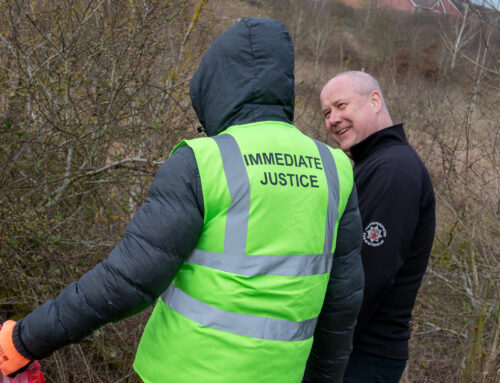PCC Stephen Mold has joined forces with other PCCs in the UK to call for a new approach to young adults in court in order to cut reoffending.
A new report, published today by the Centre for Justice Innovation and the Transition to Adulthood Alliance, suggests that a fairer and distinct approach to how the courts deal with young adults could reduce reoffending, meaning fewer victims of crime.
The report sets out a blueprint for a new approach to 18-25 year olds in court, developed over the last two years by criminal justice practitioners in five areas of England and Wales as well as young adults themselves. These areas have worked with the Centre for Justice Innovation to develop a model that could be delivered within current law and at no extra cost to the public.
The adapted court model draws upon scientific international research that has shown young adults’ brain development and maturity makes them a group distinct from both children and from fully mature adults. The proposed changes are based on ‘procedural fairness’ evidence (1) that suggests a more understandable and fairer court process is likely to increase young adults’ compliance with court orders and reduce young adults’ likelihood of committing further offences.
This new approach has the support of Commissioner Mold as well as the Commissioners of Leicestershire, the West Midlands, and South Wales.
Speaking on behalf of the four PCCs, Stephen Mold said:
“This innovative multi-agency approach has the potential to benefit not only the young adults but the Criminal Justice System as a whole. Early intervention will present these young people with the opportunity to change their behaviour before their pattern of offending becomes more deeply-rooted.
There is a high degree of local enthusiasm in each of our areas for the pilots and much thought has been put into how the pilots could work in practice.”
The Ministry of Justice and the London Mayor’s Office for Policing and Crime, along with the judiciary, have also recently announced they are exploring the potential for a young adult appropriate court in London.
These proposed changes also have the support of the influential House of Commons Justice Select Committee, who in their 2017 report on young adults in the criminal justice system said, “there is a strong case for a distinct approach to the treatment of young adults in the criminal justice system… The potential of young adult courts are worth testing.”
Moreover, the recent report by David Lammy MP on trust of Black, Asian and Minority Ethnic defendants in the criminal justice system stressed that “To build trust, the challenge is to demystify decision making processes and bring them out into the open, so they can be better understood.”
Phil Bowen, the Centre’s Director said; “The evidence behind procedural fairness is simple— people are more likely to obey a court’s decision when the court process is made more understandable and more transparent. The model outlined in this report offers a clear way forward to making this happen in practice.”
The Barrow Cadbury Trust, an independent charitable foundation, funded the report and has committed to support further consultancy to help implement the model in local areas, and evaluate its impact.





